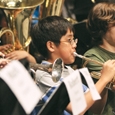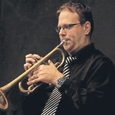
As students prepare for district and state festival auditions, there are many ways directors can help them. However difficult the music may be, preparing auditions presents an excellent opportunity for orchestra and band directors to create something exciting to which young players can aspire.
Review the music in advance and share with your students what difficulties they will find in the music. On a practical level, before handing out the music, make sure the print is clear; blow it up for them if it is small, and create a more legible version for them if it is blurry. Within the first week, make sure each student has access to a recording of the excerpts. If there are no professionals in your community to provide a model for you, contact your college buddies and ask them to upload a video for your students to watch.
Bring People Together
Having a major audition can be a good excuse to create a practice buddy system, which will continue to benefit students throughout the rest of the year. When making practice buddy assignments, match students who are playing at a similar level and whose personalities are a good fit. Encourage practice buddies to meet after school, either in a practice room or in one of their homes. Check in with students periodically to make sure they are meeting with their buddy and keeping each other on course.
Sectionals save time for all students by ensuring that everyone learns the music correctly the first time. Use sectionals before and after school to provide students with guided and supervised practice. These sectionals will jump-start students who don’t have the confidence to face the audition music on their own. During the first sectional, talk about effective practice strategies, and break each etude into three or four shorter sections to help them focus and prioritize their practice.
Once the students have begun to make headway on the excerpts, invite a professional to perform the music for the give a masterclass for the students who play that instrument. Also ask the clinician to prepare some comments for the band or orchestra as a whole about audition preparation strategies and tips for performing under pressure. Even if students have already heard the same thing numerous times from you and their private teachers, students will take it seriously from someone they perceive as an expert.
Use Available Tools
Too many students like to keep their sheet music in mint condition, but this is a mistake. Teach students to mark their music as needed, writing reminders in problem spots that are just big enough that they catch their eye when they are playing. Show them your marked-up scores to help reinforce that good musicians mark their music freely to avoid repeating familiar mistakes.
For students who are not able to purchase a tuner or metronome, create a sign-out list for students to use the band equipment on school premises. Similarly, ask students if they have a quiet place to practice at home, and provide opportunities for students who lack this resource to sign out practice rooms or the band hall. When possible, use after-school time to listen to students practicing and offer suggestions as appropriate.
As students begin to progress on the music, use recording assignments to mark their progress, establishing in advance the dates on which each segment will be recorded. The first assignment should be a recording of the whole etude, so they can go back to this recording near the audition date and see how far they have come. Be sure to specify tempo and musical goals as appropriate, and consider using rewards to recognize superior accomplishment. Grade students on both preparation and improvement.
Audition Practice
In-class playoffs are an intense attention-getter for students. Nothing puts the students more on the edge of their seats than thinking they might be playing for their peers that day in band. Give students a few days’ notice so thay have time to practice. Then, each day, draw a name randomly out of a hat and ask that student to perform. Students work hard to avoid looking unprepared; this gives them practice channeling their nerves. The result is a classroom of extremely prepared students.
To encourage students who otherwise might not take such auditions, it is helpful to make portions of the music mandatory for chair placement auditions or challenges. Besides providing additional experience for students who are auditioning, it engages students who would otherwise avoid such challenging music.
Recognition
Once the audition has passed, be sure to recognize students who auditioned. Let students know in advance that the winners are the ones who went for it, not just the ones who made it. These students deserve the recognition from the teacher and their peers for their hard work and audacity. Seeing this year’s students rewarded with praise from their teacher and fellow students will motivate the other students for future years.






